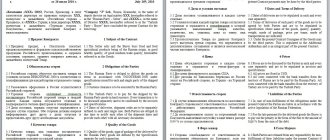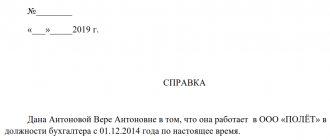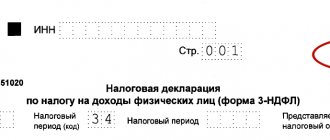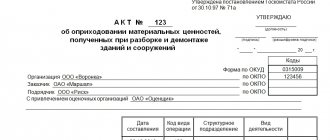Upon receipt of the request, the taxpayer must within six working days
send a receipt of acceptance or notification of refusal to the tax office. For “Request for payment of taxes, penalties, fines” the deadline for sending a receipt is 1 business day. The countdown begins the next day after the date specified in the confirmation of the electronic document management operator.
If you do not confirm receipt of the request within the specified period, NI may block accounts
organizations.
Set up notifications in VLSI so you don't miss the arrival of new requirements.
WHEN YOU CAN RESPOND TO THE REQUIREMENTS OF THE IFTS WITH A POLITE REFUSAL
Total - more than two weeks. However, keep in mind that now many special operators have configured their programs in such a way that the requirement cannot be read until you send a receipt for its receipt. And some inspectorates sometimes send a requirement by TKS, stating in it that if an acceptance receipt is not generated within a day, the requirement will be sent by mail. Let us remind you that when sending a request by mail, it is considered received after the expiration of a six-day period from the date of sending a registered letter <p. 1 tbsp. 93 and paragraph 4 of Art. 93.1 Tax Code of the Russian Federation>. Let us also recall that since 2015, the tax authority can suspend transactions on the taxpayer’s bank accounts if a receipt for the acceptance of any of the following documents has not been submitted through the TCS: (i) requirements for the presentation of documents <p. 1 tbsp. 93 Tax Code of the Russian Federation, clause 2, 4 art. 93.1 Tax Code of the Russian Federation>; (i) requirements for the provision of explanations <p. 3 tbsp. 88 Tax Code of the Russian Federation>; (i) notice of summons to the tax authority <pp. 4 paragraphs 1 art. 31 Tax Code of the Russian Federation>. The head of the tax authority (his deputy) can make an appropriate decision within 10 working days from the date of expiration of the deadline for transferring such a receipt <subparagraph 2, paragraph 3, article 76 of the Tax Code of the Russian Federation>.
An application for property tax benefits must be submitted no later than April 1
An application for property tax relief must be submitted no later than April 1. First of all, this applies to those individuals whose right to tax benefits arose for the first time in 2018, for example, in connection with retirement.
Timely submission of an application is necessary for the correct implementation of mass tax calculations (transport, land taxes and property taxes).
In this case, the tax notice for 2021 will be generated taking into account the application, and taxes will not have to be recalculated. If an application for a tax benefit was previously sent to the tax authority and it did not indicate that the benefit would be used for a limited period, there is no need to resubmit the application.
In case of failure to submit an application for benefits, taxes for 2021 will be calculated in full.
Information about established tax benefits in specific municipalities can be found using the “Reference Information on Property Tax Rates and Benefits” service.
Source - Federal Tax Service of Russia for the Nizhny Novgorod region
Electronic document management with the tax authority
Order of the Federal Tax Service of Russia dated June 13, 2013 N ММВ-7-6/ [email protected] approved the Methodological recommendations for organizing electronic document flow between tax authorities and taxpayers for information services and informing taxpayers in electronic form via telecommunication channels (hereinafter referred to as the Methodological recommendations). The document regulates information services and informing taxpayers in electronic form via telecommunication channels (TCS).
Information services and taxpayer information
In accordance with paragraphs. 4 paragraphs 1 art. 32 of the Tax Code of the Russian Federation, tax authorities are obliged to inform free of charge (including in writing) taxpayers, payers of fees and tax agents about current taxes and fees, legislation on taxes and fees and normative legal acts adopted in accordance with it, the procedure for calculating and paying taxes and fees, the rights and obligations of taxpayers, fee payers and tax agents, the powers of tax authorities and their officials, as well as provide forms of tax returns (calculations) and explain the procedure for filling them out.
In order to implement the procedure for the exchange of electronic documents between tax authorities and taxpayers (representatives) when providing information services and informing in electronic form on the TKS in accordance with the Administrative Regulations of the Federal Tax Service of Russia <1>, Methodological Recommendations have been developed. The document defines:
- sequence of electronic document flow between tax authorities and taxpayers using an electronic signature (ES);
- a list of mandatory functions and the frequency of their implementation for each participant in the interaction, which must be implemented in the relevant software products;
- requirements for timing characteristics of functions, software products, interaction in emergency situations.
<1> Administrative regulations of the Federal Tax Service for the provision of public services for free information (including in writing) to taxpayers, fee payers and tax agents about current taxes and fees, legislation on taxes and fees and regulatory legal acts adopted in accordance with it , the procedure for calculating and paying taxes and fees, the rights and responsibilities of taxpayers, fee payers and tax agents, the powers of tax authorities and their officials, as well as for the acceptance of tax returns (calculations), approved. By Order of the Ministry of Finance of Russia dated July 2, 2012 N 99n.
Direct participants in information interaction are taxpayers (representatives), tax authorities, and specialized telecom operators. In this case, information interaction between the taxpayer and the tax authority can occur both through a special operator and directly.
What documents can be obtained electronically via TKS?
Information services to taxpayers (representatives) include submission by tax authorities in electronic form of the following documents:
- certificates on the status of settlements for taxes, fees, penalties, fines (form and format approved by Order of the Federal Tax Service of Russia dated January 28, 2013 N ММВ-7-12/ [email protected] );
- certificates confirming the fulfillment by the taxpayer (payer of fees, tax agent) of the obligation to pay taxes, fees, penalties, fines (form and format approved by Order of the Federal Tax Service of Russia dated January 21, 2013 N ММВ-7-12/ [email protected] );
- statements of transactions for settlements with the budget (the form is given in Appendix 4 to the Methodological Recommendations);
- list of tax returns (calculations) and financial statements presented in the reporting year (the form is given in Appendix 5 to the Methodological Recommendations);
- act of reconciliation of calculations for taxes, fees, penalties and fines (form approved by Order of the Federal Tax Service of Russia dated August 20, 2007 N MM-3-25/ [email protected] ).
Note! Responses to requests are generated automatically based on data from information resources of tax authorities.
Document forms are RTF, XML, XLS, PDF files. In this case, the names of RTF and XLS files must match the name of the XML file, but with the extension .rtf, .xls, .pdf.
Requirements for the taxpayer
Information interaction in electronic form according to the TKS is carried out between taxpayers (representatives) and tax authorities with which taxpayers are registered:
- at the location of the organization;
- at the location of its separate divisions;
- at the place of residence of the individual, as well as at the location of the real estate and vehicles belonging to him;
- on other grounds provided for by the Tax Code of the Russian Federation.
Taxpayers classified as the largest taxpayers carry out information interaction in electronic form via TKS with the tax authority at the place of registration as the largest taxpayer. Tax authorities at the location of the largest taxpayer, at the location of his separate divisions, as well as at the location of the real estate and vehicles owned by him and on other grounds provided for by the Tax Code of the Russian Federation, interact with the taxpayer through the tax authority at the place of his registration as such a taxpayer .
Tax authorities provide these information services in electronic form via the TKS if the taxpayer (representative) interacts with them via the TKS and is registered as a participant in electronic document management in accordance with the requirements of the electronic document management system of the Federal Tax Service.
Cryptographic information protection means used in information interaction must be certified in accordance with the legislation of the Russian Federation and compatible with similar means used by the Federal Tax Service.
Basic principles of electronic document management
In the process of electronic document management, the parties exchange the following electronic documents:
- request;
- appeal;
- information message about the representation;
- acceptance receipt;
- notification of refusal of admission;
- confirmation of dispatch date;
- response to a request;
- letter from the tax authority;
- newsletter;
- technological electronic messages;
- notification of receipt;
- error message.
For your information. Confirmation of the date of dispatch is an electronic document generated by a specialized telecom operator or tax authority, containing data on the date and time of sending by the taxpayer (representative), the tax authority of the document in electronic form according to the TKS.
Receipt of acceptance is an electronic document generated by the tax authority confirming the fact of acceptance for processing of a request (application) submitted by a taxpayer (representative) in electronic form under the TKS.
Notice of receipt is a technological electronic message generated by the recipient for the sender, informing the sender about the receipt of the electronic document.
Forms and formats of documents are approved by Order of the Federal Tax Service of Russia dated 06/09/2011 N ММВ-7-6/ [email protected]
If the taxpayer is a participant in the electronic document flow, in order to receive information from the tax authorities, he must send a request (application) in electronic form, signed by electronic signature, to the tax authority. If a representative of a taxpayer applies for information, a power of attorney is required confirming his right to receive information services or a response from the tax authority, which is submitted to the tax authority before the request (application). A copy of the power of attorney is retained by the tax authority for three years after its expiration.
The right to sign electronic signatures of documents participating in electronic document management is granted to officials of the taxpayer (representative) and special operators whose powers are established (confirmed) in accordance with the legislation of the Russian Federation. Documents sent by the tax authority are signed using electronic signature tools used to automatically create electronic signatures in the system.
In response to the request, the taxpayer (representative) is sent a set of responses and (or) notifications of refusal to accept, generated by the tax authorities at the taxpayer’s place of registration.
The Methodological Recommendations provide the reasons why information at the request of a taxpayer (his representative) is not provided :
- the request is sent to the tax authority, whose competence does not include providing information on it;
- the request does not comply with the established format;
- the request of the taxpayer's representative was sent without attaching an information message about the representation, confirming in the prescribed manner the authority of the representative to receive information;
- there is no ES of the taxpayer (representative), the owner of the ES who signed the request does not have the appropriate authority, the signatory data from the request does not correspond to the data of the owner of the electronic signature verification key certificate, the ES does not correspond to the document.
In such cases, the taxpayer (representative) is sent a notice of refusal to accept, indicating the reason for the refusal.
When sending a request to a taxpayer, the following rules must be taken into account:
- one request contains information on one taxpayer for one reporting year, for one period;
- Only one of the documents listed above can be requested in one request;
- The request must indicate the date as of which the response to it is generated. If the request does not indicate a date or indicates a future date, the response is generated on the date of registration of this request with the tax authority;
- when sending a request for information on the organization as a whole, the identifier of the final recipient in the file name and the details “IFTS” are filled in equal to “0000”, the details “Taxpayer Checkpoint” are not filled in;
- additional request details (KBK, OKATO/OKTMO) can be filled in when requesting an extract and reconciliation report. If additional details are not filled in, the response to the request is generated for all tax obligations of the taxpayer. If the request specifies KBK and OKATO/OKTMO, for some of which the tax authority does not have open tax obligations, the tax authority generates a response only for open tax obligations. If the tax authority does not have open tax obligations for all KBK and OKATO/OKTMO specified in the request, then a corresponding entry is made in the response.
We also note the following features of submitting individual documents in electronic form:
- a certificate of the status of settlements is generated by the tax authority for all tax obligations opened therein;
- the reconciliation act is intended only to inform the payer about the status of his payments and is not subject to return to the tax authority with the completed columns “Taxpayer Data”, “Differences”, “Results of Joint Reconciliation”;
- When submitting a certificate of fulfillment of an obligation, the list of responses generated by the tax authorities, in which the taxpayer is registered on various grounds provided for by the Tax Code of the Russian Federation, is automatically analyzed, and if there is no debt, the entry “does not have an unfulfilled obligation” is entered. Otherwise, the taxpayer is sent a certificate with the entry “has an unfulfilled obligation” indicating in the appendix the codes of the tax authorities in which he has an unfulfilled obligation.
When can you use maternity capital?
20.04.2019 1726
A woman who gave birth (adopted) a second or subsequent child from January 1, 2007 to December 31, 2021, can issue a certificate for maternity capital immediately after the birth of the baby or later at any convenient time, since the period for applying for it is not limited.
After submitting an application with a complete set of required documents, PFR specialists review the information provided by the applicant within 1 calendar month and make a decision to issue a certificate or to refuse the applicant to receive it. Within 5 days, the applicant is sent a corresponding notification of the decision.
You can send funds provided for by this program of state support for families with children (453,026 rubles in 2018) after 3 years after becoming eligible to receive a certificate. This can be done in the following areas:
- improvement of housing without attracting loans or borrowings;
- payment for the child’s education or maintenance in kindergarten;
- for the mother's future pension.
However, in the following two areas it is possible to realize maternity capital without waiting for the third birthday of the child in connection with whose birth or adoption this certificate was issued:
- payment of the down payment or principal and interest on a loan taken for the purchase or construction of housing, including a mortgage;
- purchasing goods intended for the adaptation of a disabled child to society.
An application with the appropriate package of documents for the sale of family capital is considered by Pension Fund employees within a period not exceeding 1 month. After a positive decision is made, the money is credited to the account specified in the application, depending on the direction of use of the maternity capital, within another 10 working days.
Storage of electronic documents
According to the requirements of the Methodological Recommendations, sent and received electronic documents are subject to storage in electronic document storages of participants in information interaction together with the corresponding open certificates of electronic signature verification keys. This means that taxpayers who are participants in such information interaction are also required to comply with these requirements for storing electronic documents.
The storage of electronic documents of tax authorities for each electronic document must contain the following information, provided for by the List of mandatory information on documents used for the purpose of recording and searching for documents in the electronic document management systems of federal executive authorities, approved by Decree of the Government of the Russian Federation of June 15, 2009 N 477:
- addressee;
- destination;
- position, surname and initials of the person who signed the document;
- document type;
- document date;
- Document Number;
- date of receipt of the document;
- incoming document number;
- link to the outgoing number and date of the document;
- title or abstract of the document;
- case index;
- information about document forwarding;
- number of sheets of the main document;
- number of applications;
- total number of application sheets;
- instructions for the execution of the document;
- position, surname and initials of the performer;
- privacy notice.
The storage period for electronic documents must comply with the List of documents generated in the activities of the Federal Tax Service, its territorial bodies and subordinate organizations, indicating storage periods, approved by Order of the Federal Tax Service of Russia dated February 15, 2012 N ММВ-7-10/ [email protected]
The storage period for the documents in question should not exceed five years. At the same time, the storage period for electronic documents is similar to the storage period for paper documents.
Software tools for participants in information interaction should provide search, visualization, saving to a file and printing of electronic documents from the electronic document storage, as well as their uploading to external media in accordance with the specified parameters for the selection of electronic documents.
The Methodological Recommendations propose destroying electronic documents in the manner prescribed by the Basic Rules for the Operation of Organizational Archives, approved by the Decision of the Board of Rosarkhiv dated 02/06/2002:
- Every year, for files with expired storage periods, an act is drawn up on the allocation for destruction of documents that are not subject to storage;
- the act on the allocation of documents for destruction is drawn up after the summary inventories of permanent storage cases for the same period. The specified inventories and acts are considered at a meeting of the expert commission. The acts agreed upon by the expert commission are approved by the head.
In this case, notifications of receipt and error messages are stored in the electronic document storage for at least six months after completion of the document flow procedure.
Deadline for transfer of maternity capital
After completing a transaction corresponding to one of the areas permitted by clause 3 of Art. 7 of Law No. 256-FZ of December 29, 2006, in order to use the funds provided by maternity capital, you must contact the Pension Fund or the MFC with a full set of required documents. Pension Fund employees are required to consider this information in accordance with paragraph 1 of Art. 8 of the above law within 1 month and make a decision on the transfer of funds or refusal to transfer money.
Based on Government Decree No. 253 of 03/03/2017, after the Pension Fund approves the chosen direction for using the certificate, the money will be credited within 10 working days to the appropriate bank account specified in the application:
- credit institution account - for the down payment or repayment of a housing loan or credit (including secured by a mortgage);
- account details of the educational institution - to pay for children's education;
- seller's account - for the purchase of an apartment, house, room or share under a purchase and sale agreement;
- a bank account opened in the name of the applicant - after purchasing goods for the adaptation of a disabled child;
- bank account of a construction company or certificate holder - for building a house, respectively, with the help of contractors or independently on your own.
How long does it take to transfer money based on an approved application?
As a result, the total period from the date of filing an application for disposal of capital until the transfer of funds to the account should be no more than 1.5 months, of which:
- 1 month – document verification period;
- 0.5 months (since 10 working days make up 14 calendar days, i.e. 2 weeks or half a month) is the period for transferring financial capital funds to a bank account.
Previously, the total period for transferring funds provided for by the certificate could be up to 2 months, since the period for transferring funds, as well as the period for reviewing documents, was 1 month. Thus, this period has now been halved.
When selling maternity capital for the construction (reconstruction) of a house, the Pension Fund allocates money in two parts with an interval between payments of at least 6 months:
- no more than 50% of the due amount will be provided before the start of construction work;
- the rest - after the main construction or reconstruction of residential premises (foundation, walls, roof).
Found a mistake? Write to us! Write
* * *
In practice, these rules mean that if a taxpayer is a participant in electronic document flow with the Federal Tax Service, then he needs to specify in a local act the procedure for working with the tax authority electronically (who has the right to send requests, who is issued a power of attorney to represent relevant interests, who coordinates requests, who receives the answer to them, etc.), as well as the procedure for storing electronic documents and protecting them from unauthorized deletion.
A complete transition to electronic interaction with the Federal Tax Service is a matter of time. Agree, it is more convenient and faster to receive a list of tax returns (calculations) and financial statements submitted in the reporting year, or a reconciliation report for calculations of taxes, fees, penalties and fines in electronic form, without leaving the table, than to first go to the tax office with a letter confirming the submission of the relevant documents, and then pick them up a few days later. And this can be done quarterly, and if necessary, monthly, which will completely eliminate problems with tax payments. And as a bonus, the tax authority will send information posted on its stands (racks) and necessary for taxpayers to fulfill their obligations under the Tax Code of the Russian Federation.
S.G. Novikov
Journal expert
"Tax audit"
Service Temporarily Unavailable
3.2. Calculation of the dates for the entry into force of legal acts, taking into account various formulations indicating the moment of entry into force
Often the regulations themselves define the procedure for their entry into force. In this case, a wide variety of wording is used indicating the time of entry into force, of which the most common in federal regulations are the following:
- from the date of official publication;
- upon expiration... from the date of official publication;
- upon expiration... after the day of official publication;
- after... from the date of official publication;
- through... after the day of official publication.
Considering that the Federal Law of June 14, 1994 N 5-FZ and the Decree of the President of the Russian Federation of May 23, 1996 N 763 (clauses 7 and 12) allow for the establishment of a procedure for the entry into force of legal acts that is different from the rules provided for therein, wording on the conditions and procedure The entry into force of these acts should be taken as carefully as possible.
First of all, it is necessary to distinguish between the wording “from the day of official publication” and “after the day of official publication”. This determines the decision on what day (on the day of publication or the day after publication) the document comes into force or what day is considered the beginning of the period if the entry into force of the document is associated with the expiration of a certain period.
Supporters of one position believe that if “with” is indicated, then the first day should be considered the day of official publication, if “after”, then the period begins to be calculated on the next day after publication. This point of view is justified by the fact that since the legislator, for some reason, uses two different prepositions, it means that they differ in meaning, and therefore they must be understood literally.
Proponents of another position believe that regardless of the wording “with” or “after”, the period begins to run the next day after publication. As an argument, the rules for calculating deadlines established by industry laws are given, for example: the Civil Code of the Russian Federation (Chapter 11), the Tax Code of the Russian Federation. It is also noted that this approach is more consistent with the provisions of special regulations governing the general procedure for the entry into force of legal acts, including Federal Law dated June 14, 1994 N 5-FZ, Decree of the President of the Russian Federation dated May 23, 1996 N 763 (paragraphs 5, 6 and 12). In the listed acts, when establishing the general procedure for the entry into force of legal acts, the preposition “after” is used.
Since the legislation does not currently regulate the issue of when the period associated with the entry into force of documents begins and ends, the possibility of using existing codes to determine these terms needs to be discussed in more detail. Is it correct to apply the rules of law by analogy in this case?
There are different points of view on this issue. According to one of them, there is no reason to use the norms of industry codes to calculate the terms for the entry into force of legal acts, since these codes establish the procedure for calculating the terms for regulating specific types of legal relations. Another point of view assumes the possibility of partial use of the norms of industry codes, in particular, Articles 191 and 192 of the Civil Code of the Russian Federation (hereinafter referred to as the Civil Code of the Russian Federation), establishing, respectively, the beginning and end of a period defined by a period of time. In this case, one should proceed from the admissibility of applying civil legislation by analogy on the basis of Article 6 of the said Code.
But even if we partially use the norms of the Civil Code of the Russian Federation, ambiguity still remains. Thus, Article 192 establishes that “a period calculated in months expires on the corresponding date of the last month of the period.” The question arises: does the period expire at 00 hours or at 24 hours of the corresponding date of the last month of the period? For example, a normative act was published on January 1 and comes into force after one month from the date of official publication. If we assume that the period began to run from the date of publication, i.e. from January 1, then the date of entry into force of the document can be determined as either February 1 (if the period expires at 00 hours) or February 2 (if the period expires at 24 hours). And, by applying Article 191 of the Civil Code of the Russian Federation, according to which the course of a period defined by a period of time begins the next day after the calendar date or the occurrence of an event that determines its beginning, you can get the following date options - February 2 and February 3.
How long does it take to use the certificate?
After receiving the certificate, many families have a question about when they can use maternity capital. It should be noted that the permissible period for applying for the sale of maternity capital, as well as for obtaining a certificate, is not limited.
However, if the certificate was received before the child in connection with whose birth it was issued reached the age of three, then it can be used immediately only for:
- making a down payment or payment on a home loan;
- purchasing goods for the adaptation and integration of disabled children into society.
Maternity capital can be used for the following areas only after the child reaches 3 years of age:
- purchase or construction of housing without using a mortgage or loan;
- payment for children's education;
- formation of a mother's funded pension.
When choosing to use capital for the formation of pension savings, a woman can refuse this direction until retirement - provided that she immediately directs these funds in another direction.
Response to tax demand under TKS: deadlines
Thus, with different options for calculating deadlines, you can get different dates.
To illustrate the ambiguity in the issue of calculating the dates for the entry into force of legal acts, we will give examples of different definitions of the date of entry into force of the same document.
Example 1.
Paragraph 1 “Jurisdiction” of Chapter 4 of the Arbitration Procedure Code of the Russian Federation was put into effect ten days from the date of its official publication. The Code was published in Rossiyskaya Gazeta on July 27, 2002.
The Federal Arbitration Court of the West Siberian District determined the date of entry into force of the specified paragraph - August 6, 2002 (FAS of the West Siberian District dated 08.08.2002 N F04/2741-501/A03-2002), and the Plenum of the Supreme Arbitration Court of the Russian Federation - August 7 2002 (Resolution of the Plenum of the Supreme Arbitration Court of the Russian Federation dated December 9, 2002 N 11).
Example 2.
Federal Law No. 57-FZ dated 29.05.2002 “On introducing amendments and additions to part two of the Tax Code of the Russian Federation and to certain legislative acts of the Russian Federation” came into force after one month from the date of its official publication. The law was published in Rossiyskaya Gazeta on May 31, 2002.
The Federal Arbitration Court of the West Siberian District determined the date of entry into force of this Law - July 1, 2002 (FAS of the West Siberian District dated June 21, 2004 N F04/3382-1441/A27-2004), and the Federal Arbitration Court of the Far Eastern District - June 30 2002 (FAS Far Eastern District dated July 14, 2004 N F03-A59/04-2/1507).
About the deadlines for providing documents at the request of the Federal Tax Service
Question:
Upon receipt of a request to submit documents from the Federal Tax Service Inspectorate in electronic form via telecommunication channels, the recipient is obliged, within six days from the date of sending by the tax authority, to submit to the Federal Tax Service Inspectorate a receipt for the receipt of the specified document. At the same time, in accordance with Article 93.1 of the Tax Code of the Russian Federation, the person who received the demand is obliged to submit the requested documents within 5 days from the date of receipt of the demand. From what day should 5 days be counted - from the day the request was received or from the day the receipt of receipt of this request was sent?
Answer:
If a desk tax audit reveals errors in the tax return (calculation) and (or) contradictions between the information contained in the submitted documents, or reveals inconsistencies between the information provided by the taxpayer, the information contained in the documents available to the tax authority, and received by it during the tax control, the taxpayer is informed about this with the requirement to provide the necessary explanations within five days or make appropriate corrections within the prescribed period.
Art. 88, “Tax Code of the Russian Federation (Part One)” dated July 31, 1998 N 146-FZ (ed.
Case Study
Let's start our article with a judicial example - let me make a reservation right away: the company lost the dispute. So: The Federal State Treasury Institution “Far Eastern Territorial Administration of Property Relations” of the Ministry of Defense of the Russian Federation (abbreviated as FGKU “DVTUIO” of the Ministry of Defense of the Russian Federation) appealed to the Arbitration Court of the Primorsky Territory with an application to the Interdistrict Inspectorate of the Federal Tax Service No. 11 for the Primorsky Territory to invalidate the decision dated August 1, 2021 No. 4132. The document held the specified institution liable under paragraph 1 of Article 129.1 of the Tax Code of the Russian Federation - unlawful failure to report (untimely communication) by a person of information that, in accordance with the Tax Code of the Russian Federation, this person must report to tax inspectors.
Justifying its demands, the government agency referred to the fact that, as part of the desk audit, the legal entity provided the auditors with all the required documents and explanations for each taxable item. When the Federal Tax Service Inspectorate received another demand on the same grounds, in relation to the same objects and for the same reasons, the institution sent a response in which it indicated that the inspectors required explanations and documents that had previously been submitted for a similar request. The institution’s response was drawn up and sent within the time limit established by paragraph 3 of Article 93 of the Tax Code of the Russian Federation. Documents and correspondence are respectively attached.
Federal Tax Service No. 11 for the Primorsky Territory objected to the stated demands, pointing to the fact that the applicant was sent two different demands, each of which had to be answered independently. In the case under consideration - an explanation within the period established by paragraph 1 of paragraph 3 of Article 88 of the Tax Code of the Russian Federation.
The tax authority also referred to the fact that the registration by an institution of a letter in its internal accounting of outgoing correspondence and the assignment of an outgoing number to it within the period established by paragraph 1 of paragraph 3 of Article 88 of the Tax Code of the Russian Federation does not mean its timely sending to auditors. In accordance with Russian Post data, the tracking number was assigned to the shipment after the deadline for the response to the inspection body established by the Tax Code.
Subscribe to the magazine “Calculation” or “Calculation. Premium" for the 1st half of 2021!
These facts are confirmed by documents that the court studied during the consideration of the case and gave them a proper assessment in its decision.
So, the applicant's claim was denied. The decision of the court of first instance was supported by the appellate and cassation instances, leaving it unchanged, and the complaints were not satisfied - the decision of February 14, 2021 in case A51-25211/2019, made by the Primorsky Territory Court of Justice, Resolution of the Far Eastern District Court of July 31, 2021 No. F03 -2743/2020 in case No. A51-25211/2019.
The applicant’s mistake, due to which such a decision was made, was failure to comply with the deadlines for sending a response to the tax authorities. Let's take a closer look at the time frame within which you need to respond to the tax inspectorate if it has turned its all-seeing eye on you.
Deadline for response to tax request
dated 12/28/2016) {ConsultantPlus}
A person belonging to the category of taxpayers obliged, in accordance with paragraph 3 of Article 80 of this Code, to submit tax returns (calculations) in electronic form, must, no later than 10 days from the date of occurrence of any of the grounds for classifying this person as a specified category of taxpayers, ensure receipt of documents that are used by tax authorities in the exercise of their powers in relations regulated by the legislation on taxes and fees, from the tax authority at the place of registration in electronic form via telecommunication channels through an electronic document management operator.
The person specified in paragraph one of this paragraph is obliged to submit to the tax authority in electronic form via telecommunication channels through an electronic document management operator a receipt for the acceptance of such documents within six days from the date they were sent by the tax authority.
Art. 23, “Tax Code of the Russian Federation (Part One)” dated July 31, 1998 N 146-FZ (as amended on December 28, 2016) {ConsultantPlus}
Order of the Federal Tax Service of Russia dated February 17, 2011 N ММВ-7-2/ [email protected] approved the Procedure for sending a request for the submission of documents (information) and the procedure for submitting documents (information) at the request of the tax authority in electronic form via telecommunication channels (hereinafter referred to as the Procedure ).
According to clause 12 of the Procedure, the requirement to submit documents is considered accepted by the taxpayer if the tax authority has received an acceptance receipt signed with the taxpayer’s digital signature.
Order of the Federal Tax Service of the Russian Federation dated February 17, 2011 N ММВ-7-2/ [email protected] (as amended on November 7, 2011) “On approval of the Procedure for sending a request for the submission of documents (information) and the procedure for submitting documents (information) at the request of the tax authority to electronic form via telecommunication channels" {ConsultantPlus}
Thus, based on the provisions of the Procedure, if a request for the submission of documents (information) is sent to the taxpayer in electronic form, but is not actually opened (not read) by the taxpayer, and an acceptance receipt has not been generated and sent to the tax authority, such a request cannot be considered received by the taxpayer. In such a case, the tax authority, based on paragraph 19 of the Procedure, must send the taxpayer a request to submit documents (information) in paper form.
(Letter of the Federal Tax Service of Russia dated February 16, 2016 N ED-4-2/ [email protected] ) {ConsultantPlus}}
The period begins on the next day after the calendar date or the occurrence of the event (action) that determines its beginning.
Art. 6.1, “Tax Code of the Russian Federation (Part One)” dated July 31, 1998 N 146-FZ (as amended on December 28, 2016) {ConsultantPlus}
For example, the inspection sent you a requirement via TKS on Monday, June 22. From Tuesday, June 23 to Tuesday of the following week (June 30), you are required to send a receipt to the inspectorate for acceptance of this requirement. From the day following the day of sending such a receipt, the five-day period for submitting the information itself begins to run. For example, you sent a receipt on the last day - June 30th. In this case, June 30 is considered the date you received the inspection request. You must provide her with explanations within 5 working days: from July 1 to July 7 inclusive. Thus, you can legally give explanations to the requirement sent by the TKS inspection on June 22 until July 7. Total - more than 2 weeks.
(“General Ledger”, 2015, N 14) {ConsultantPlus}}
Thus, the period for providing documents upon request of explanations from the tax authority begins to run from the day the notification of receipt of this request is sent.
Answer prepared by: Expert “Consultation Line” NTVP “Kedr-Consultant” Maria Yuryevna Krasnoperova
When preparing the answer, SPS ConsultantPlus was used.
The answer passed quality control: Reviewer - Associate Professor of the Department of Accounting, Finance and Auditing of the Federal State Budgetary Educational Institution of Higher Education "Izhevsk State Agricultural Academy"
Selezneva Irina Akhmatyasavievna
This clarification is not official and does not entail legal consequences; it is provided in accordance with the Regulations of the CONSULTATION LINE (www.ntvpkedr.ru).
Calculation and payments upon dismissal, payment terms in 2021
The employer is obliged to make calculations and payments upon dismissal of an employee in full. Delay is not permitted by law. If an employer for any reason delays a full payment to a resigned employee, the latter has the right to write a complaint to the labor inspectorate or file a claim in court.
The employee receives a full payment upon dismissal based on the Order from the employer on the dismissal of this employee. The order has a unified form, which HR employees must adhere to.
The employer is obliged to pay the resigning employee:
- wages for actual time worked;
- compensation for unused vacation;
- severance pay in cases where it is provided for by labor legislation, a collective or labor agreement.
Wages are paid in accordance with the salary or tariff rate of the dismissing employee. The employer is obliged to pay for all time actually worked from the beginning of the month, including the last working day. For example, an employee’s salary is 32,000 rubles. He resigns on March 23. In March there were 21 working days, the employee worked 14 days. Salary for March 32,000 / 21 * 14 = 21,333 rubles.
Compensation for unused vacation depends on the employee’s average earnings for the last “working” year, as well as on the number of months when vacation was not used. Also, an employee can first go on vacation and then resign immediately. For example, upon dismissal, an employee has 9 days of vacation. The compensation will be equal to 32,000 / 29.3 * 9 = 9,829.3 rubles.
Severance pay is paid in cases provided for in Art. 81 of the Labor Code of the Russian Federation, when dismissal occurs at the initiative of the employer:
- reduction of staff or number of employees;
- liquidation of the enterprise;
- the employee’s refusal to move with the employer or transfer to another position;
- conscription of an employee into the army;
- recognition of an employee as unfit to perform this work due to a medical report.
The amount of severance pay depends on the grounds for dismissal. In the first two cases, the amount of severance pay is equal to the average salary of the dismissing employee for a month, in the rest - only for 2 weeks. In case of staff reduction and liquidation of the enterprise, the employer is also obliged to pay the employee benefits for the next 2 months for the period of employment.
Also, the payment of labor benefits upon dismissal may be stipulated in an employment or collective agreement.








